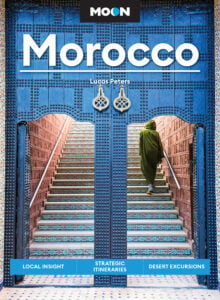 Originally published in 1921, Morocco That Was is a first-hand narrative account of a pivotal turning point in Morocco’s history. Walter Harris, the author of the book, first arrived in Morocco in 1887 and died in Tangier in 1933, having lived through the tumultuous last years of Morocco’s ruling Sultans and the loss of the country’s independence. Vivid and lively, his writing puts unusual humanism and detail to the historical parade of conquests and political maneuvering that marked Morocco during his years there as a correspondent for The Times of London. This book has remained a travel classic for good reason–it takes the reader by the hand and shows a new world, with all its the foibles, valor, horror and splendor. Like a good travel companion and a friend, Harris shows us the Morocco he knew.
Originally published in 1921, Morocco That Was is a first-hand narrative account of a pivotal turning point in Morocco’s history. Walter Harris, the author of the book, first arrived in Morocco in 1887 and died in Tangier in 1933, having lived through the tumultuous last years of Morocco’s ruling Sultans and the loss of the country’s independence. Vivid and lively, his writing puts unusual humanism and detail to the historical parade of conquests and political maneuvering that marked Morocco during his years there as a correspondent for The Times of London. This book has remained a travel classic for good reason–it takes the reader by the hand and shows a new world, with all its the foibles, valor, horror and splendor. Like a good travel companion and a friend, Harris shows us the Morocco he knew.
There are few places now that are as inaccessible as Morocco was a century and a half ago. It was a formidable and vast landscape, guarding itself from invasion both physical and cultural, and a closed society in an almost constant internal power struggle among ruling factions. It was dangerous, uncomfortable and unwelcoming for outsiders. The stories of Walter Harris are remarkable not just for the detail rendered in all strata of Moroccan life, from the Moorish court to the mountain tribes, but for the access that was granted to a foreigner. He was an intimate of the Sultanate, protected by the warring clans, and so beloved in his adopted hometown of Tangier that almost the entire city shut down for his funeral.
Many of his accounts would seem like outlandish exaggerations for the sake of a good story, were it not for their external verification. Harris is considered an expert by historians, despite the sometimes melodramatic and self-important tone of his writing. Storytelling of this caliber was once the common trope of travelers, and Harris was no exception. He weaves himself into court pageantry, international intrigue, and battlefield drama with a sharp eye and a sharper tongue. A modern reader will note some of his more anachronistic biases (a very Euro-centric view of religion, culture, women, etc.), but his passion for the people and landscape of Morocco will resonate with a true traveler. The world, and Morocco’s corner of it, is a smaller place than it was a century ago, but many will still find Walter Harris a kindred spirit–those of us who see a human story behind the facts of history; those of us who believe life is an adventure for the open-hearted.
Written by Erin Tolman.








